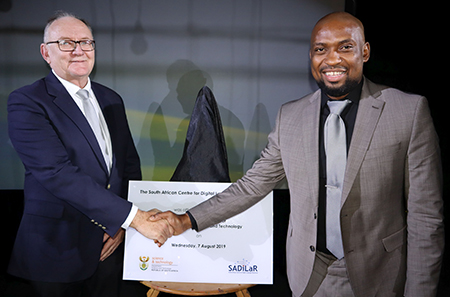At last! Hard work and dedication finally paid off. The government-established South African Centre for Digital Language Resources (SADiLaR) was officially launched on 7 August 2019 on the North-West University’s (NWU’s) campus in Potchefstroom.
SADiLaR is a platform that creates and manages digital resources and software supporting research and development in language technologies and related studies in all 11 the official languages of South Africa.
It is no secret that, within the South African context, African languages are under-resourced with regard to sufficient digitisation tools to function effectively in the modern, digital world. One of the main missions of SADiLaR is to address this matter in order to provide the tools to help prepare these languages to take their rightful place in the world of language technology.
SADiLaR is part of the South African Research Infrastructure Roadmap (SARIR) programme, which came about as a result of a major investment by the Department of Science and Technology (DST).
The centre, having been in its incubation and development phase since 2016, has now reached maturity and was officially launched by the Deputy Minister of Higher Education, Science and Technology, Buti Manamela.
Speaking at the launch, he said research in the humanities and social sciences had undergone a global paradigm shift over the past two decades, as information and communication technologies had advanced and access to digital resources had increased.
“This has given rise to the ever-expanding interdisciplinary domain of research and development referred to as digital humanities,” said Mr Manamela, adding that SADiLaR was one of the government’s responses to the fourth industrial revolution.
He said that artificial intelligence was already calling into question many fundamental assumptions about the uniqueness of human communication, as the automation of speech and voice recognition opens up radical new options for dissociating languages from humans.
“SADiLaR will play a strategic role in empowering researchers to rise to the challenges and opportunities of the new era, and we as government are proud to be associated with them.”
According to Prof Attie de Lange, director of SADiLaR, this centre, which is hosted by the NWU, has an enabling function, with a focus on all the official languages of South Africa and on serving all tertiary-education institutions in the country.
“We regard it as our responsibility to support research and development in the domains of language technologies and language-related studies. With our training and workshops in the use of digital infrastructure and digital tools at national level, SADiLaR aims to unlock the full spectrum of resources to create a broader digitalised footprint for South African indigenous languages,” he said.
“We propose to do this together with our partners, namely the Council for Scientific and Industrial Research, the University of South Africa, the University of Pretoria, the Inter-institutional Centre for Language Development and Assessment, and the NWU’s Centre for Text Technology (CTexT®).
“We have a very strong focus towards the training of a new generation of researchers, and will also engage in the development of new nodes. Over the next few years, we would like to achieve the next level of our involvement in the development of South Africa's indigenous languages.”
SADiLaR mainly runs two programmes:
- A digitisation programme, which entails the systematic creation of relevant digital text, speech and multi-modal resources relating to all the official languages of South Africa. The development of appropriate natural-language-processing software tools for research and development purposes is included as part of the digitisation programme.
- A digital humanities programme, which facilitates the building of research capacity by promoting and supporting the use of digital data and innovative methodological approaches within the humanities and social sciences.
The centre has already established an academic scholarship initiative to create awareness of the value and role of digital language resources in academic research and product development, and to foster the establishment of digital humanities at various tertiary academic institutions.
SADiLaR is also honoured to be the only digital language research centre outside Europe that forms part of the European CLARIN research network as a C-Centre. CLARIN is an acronym for common language resources and technology infrastructure, working in the field of archiving and processing of language-related resources in the humanities and social sciences.
According to CLARIN’s executive director, Prof Franciska de Jong, they regard SADiLaR as a valuable partner and were very excited about the news that the South African government had decided to invest in the centre.
“Our aim is to gather and further develop as much digital language data as possible in order to help with the development of South Africa’s indigenous languages. We also foresee SADiLaR taking over the role of language development on the African continent and providing the much-needed infrastructure platform for researchers in Africa,” she said.
Prof Dan Kgwadi, vice chancellor of the NWU, commended the partnership between SADiLaR and the Department of Science and Technology and thanked the government for their huge investment of R81 million over the next three years.
“We believe that SADiLaR will have a huge impact in the lives of our fellow South Africans, and we look forward to following the centre’s progress,” he said.

Prof Attie de Lange, Director of SADiLaR and the Deputy Minister of Higher Education, Science and Technology, Buti Manamela.
Issued by: The South African Centre for Digital Language Resources (SADiLaR)
Enquiries: Liané van den Bergh, SADiLaR, +27 18 285 2870, info@sadilar.org
